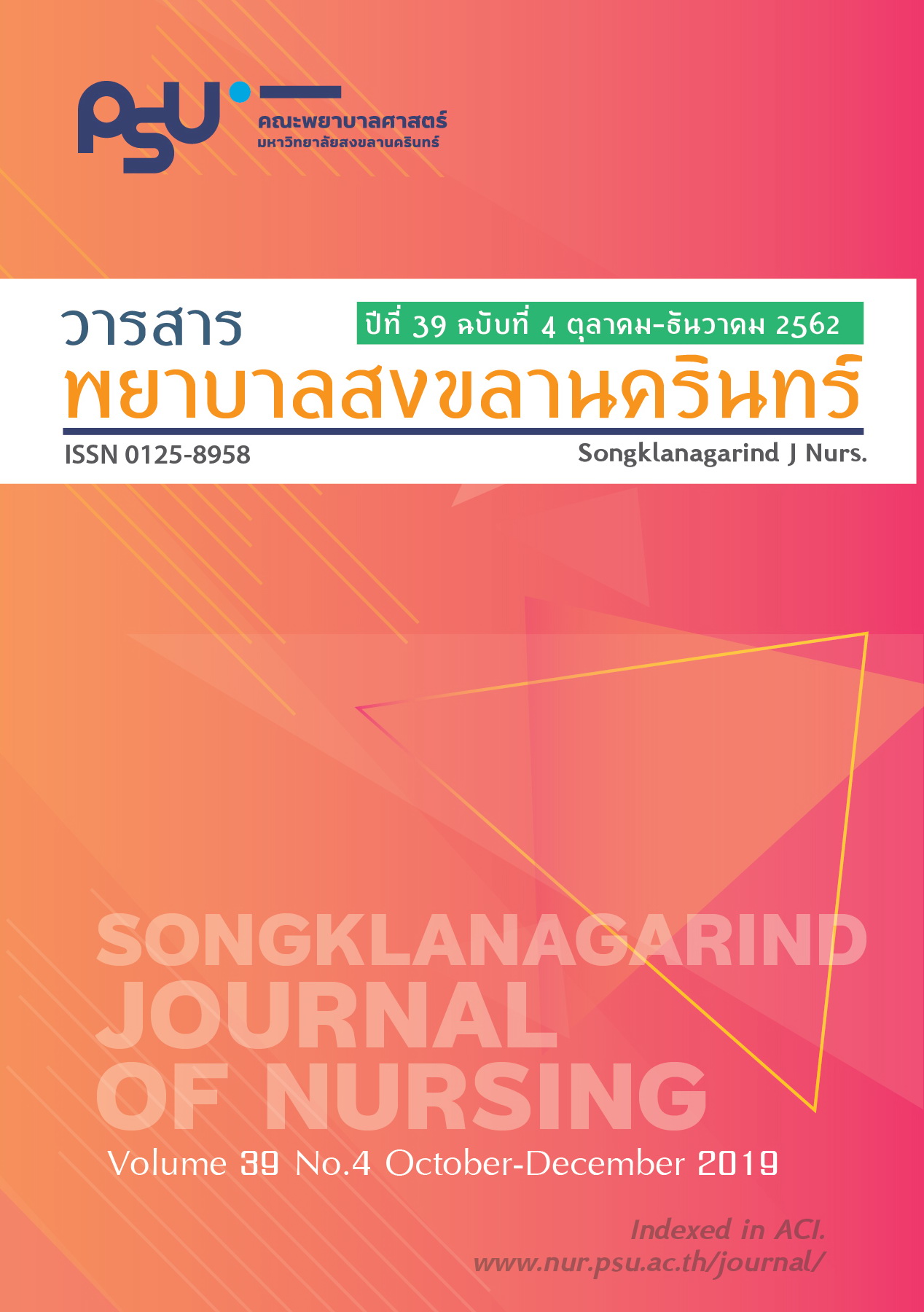Stress and Adaptation Among Families Living with HIV/AIDS Persons: Case Analysis by Family Resiliency Theory
Main Article Content
Abstract
HIV/AIDS is a chronic infectious disease that is public health problem of global scale. Its highly epidemic nature, high mortality rate, and lack of cure regimen for it cause stress to the whole family system. Literature review suggested previous studies mostly emphasized on stress and adaptation of HIV/AIDS persons and caregivers. This article was aimed at presenting case analysis based on the model of Family Stress and Adaptation or Family Resiliency Theory that defines comprising factors as stressor, vulnerability, perception, coping, family typing and function, resources, and adaptation outcome. Health personnel, especially, professional nurses should assess stress and adaptation of family with HIV/AIDS persons as a whole system for developing interventions that could help family and persons with HIV/AIDS in decreasing stress and increasing effective adaptation, which would result in good quality of life.
Article Details
References
Kulathirathorn T. Factors affecting the adaptation of HIV/AIDS person in a hospital in Trang. Trang: Sirindhorn College of Public Health; 2016. Thai.
World Health Organization. Global health sector strategy on HIV, 2016-2021. [Internet]. 2017. [Cited 2018 February 24] From http://www.who.int/mediacentre/en/
Department of Disease Control. New 506/1 AIDS surveillance guideline. Nonthaburi: The Ministry of Public Health; 2016. Thai.
Department of Disease Control. Summary of AIDS and HIV infection in Thailand. Nonthaburi: The Ministry of Public Health; 2015. Thai.
Anupapvisedkul P. Factors predicting maternal role attainment among HIV-seropositive mothers. JNSH; 2016; 39(2): 44-53 . Thai.
Phuket Provincial Public Health Office. AIDS surveillance. Phuket: The Office; 2015. Thai.
Tangkittipaporn J. Psychology. 1st ed. Bangkok: Chulalongkorn University; 2013. Thai.
Pumsanguan K, Prajankett O. Stress appraisal and coping strategies of HIV/AIDS infected people in the infectious disease division of Phramongkutklao hospital. JRTAN 2013; 14(3): 14-21. Thai.
Chaisiri L. Community participation in analyzing strategies to enhance the quality of life of working-age people with HIV/AIDS. Journal of Nurses’ Association of Thailand, North-Eastern Division 2011; 29(4):79-89. Thai.
Lazarus R S, Folkman S. Stress, appraisal, and coping. New York: Springer Publishing Company; 1984.
Gungjumpa R. End of cancer patient life nursing care through the resiliency framework. Khon Kaen: Master of Nursing Science Program in Family Nurse Practitioner, Khon Kaen University 2009. p.1-191. Thai.
Rungruangkalakit S, Kotnara I,. Resilience: A review literature. Khon Kaen University: JNSH 2009; 32(1): 90-101. Thai.
Friedman MM, Bowden VR, Jones EG. Family nursing: Research theory & practice. 5 th ed. New Jersey: Upper Saddle Rive; 2003.
Hunziker S. Impact of a stress coping strategy on perceived stress levels and performance during a simulated cardiopulmonary resuscitation: A randomized controlled trial. BMC: EM 2013; 13(8). http://www.biomedcentral.com/1471-227X/13/8
McCubbin H I, Thompson A, McCubbin M A. Family assessment: Resiliency, coping and adaptation. Madison: University of Wisconsin Press; 1996.
Danielson C.B., Hamel B, & Fry P. Families Health and Illness Perspectives on Coping and Intervention. [n.p.]: Mosby-Yearbook; 1993.
Suppaseemanont W. Stress and coping methods of families caring for AIDS patients. Burapha University: JFN 1996; 5(2): 9-18. Thai.
Frain M P, Norman L, Fong Chan, & Molly K. Tschopp. Family resiliency, uncertainty, optimism, and the quality of life of individuals with HIV/AIDS. RCB 2008; 5(1): 16-27.
Rosyidin S. Analysis of affective factors of family resiliency in family with positive HIV children in Surabaya: Analytic descriptive research. Proceedings of the 8 th International Nursing Conference on education, practice and research development in nursing; 2017.
Rick A M, Williams R C. Haley M, et al. Crisis intervention with families: Assessing changes in family characteristics. The Family Journal: CTCF 2014; 22(2): 179-85.
Aroonroong A, Thanabribor C, Wungain N. Development of role adaptation towards self and family of patients with aids through family counseling. Bangkok: JBCN 2015; 31(1): 26-35. Thai.

